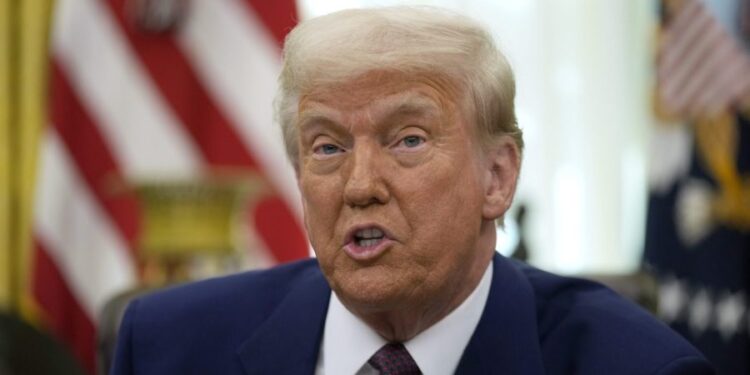
President Trump on Thursday signed a presidential memorandum proposing reciprocal tariffs that he maintains will crack down on unfair and discriminatory tariffs from both adversaries and allies.
The reciprocal tariffs will be customized for each foreign trading partner, based on five different areas: tariffs the nation imposes on U.S. products, unfair taxes imposed, cost to U.S. businesses and consumers from another country’s policies, exchange rates, and any other practices the trade representative’s office determines is unfair.
The tariffs will not be immediately imposed but the signing of the memo allows his administration to begin a review process to get them started. White House officials said that Trump wants to move rapidly on imposing the tariffs, suggesting it would be “weeks” and no longer than “a few months” until they are in place.
The president in the memo directs Commerce secretary nominee Howard Lutnick and U.S. trade representative nominee Jamieson Greer to consult with Treasury Secretary Scott Bessent and Homeland Security Secretary Kristi Noem, among others, so they can “quickly” submit a report detailing their proposals for each country.
Office of Management and Budget head Russell Vought would then submit a report within 180 days to assess the fiscal impact of the tariffs.
Lutnick on Thursday predicted the new tariffs would be imposed on April 2.
“Our studies should be all complete by April 1. So we’ll hand the president the opportunity to start on April 2, if he wants,” he said in the Oval Office.
The president, meanwhile, suggested jobs will be positively impacted by these tariffs but that prices could temporarily get worse.
“I think what’s going to go up is jobs are going to go up, and prices could go up somewhat short term, but prices will also go down,” Trump said. “Long term, it’s going to make our country a fortune.”
Trump is focused on what officials call “nonmonetary barriers,” which officials defined as ways different countries “take advantage of the U.S.,” citing Japan’s high structural barriers and India’s particularly high tariffs.
“It doesn’t matter whether it’s strategic competitors, like communist China, or allies like [the] European Union or Japan or Korea. Every one of those countries is taking advantage of us in different ways, and the president characterizes this as a lack of reciprocal trade,” a Trump official said.
Trump announced the memorandum ahead of his meeting with Indian Prime Minister Narendra Modi at the White House later on Thursday.
Trump on Monday also signed proclamations to bolster tariffs on all steel and aluminum imports into the United States and crack down on attempts by China and Russia to evade penalties.
Updated 2:59 p.m.







